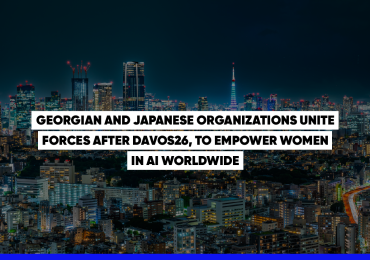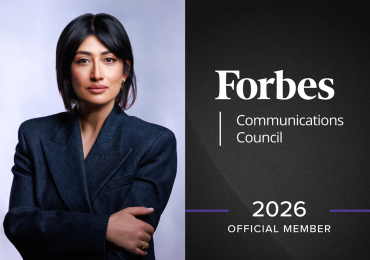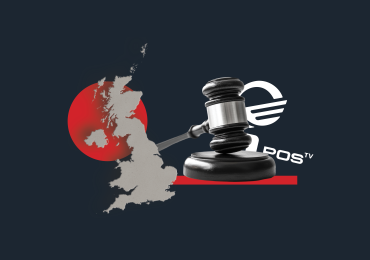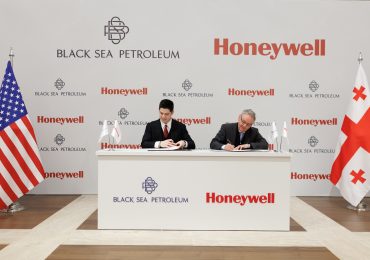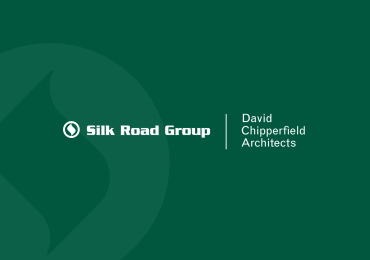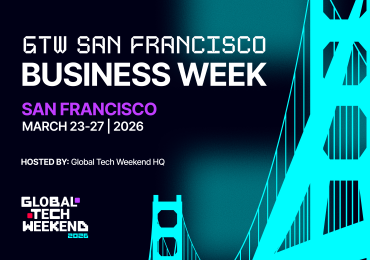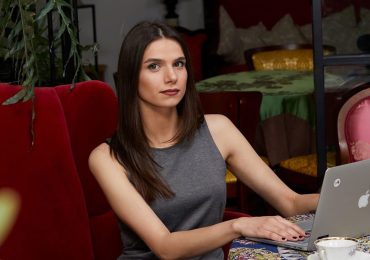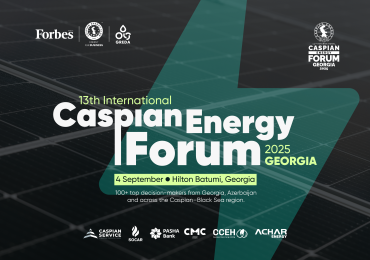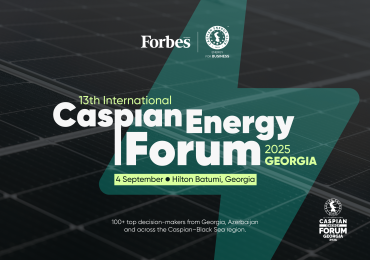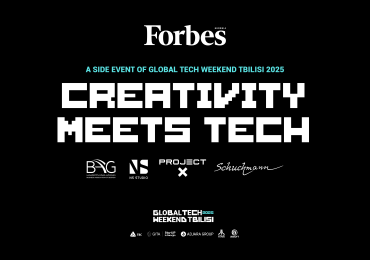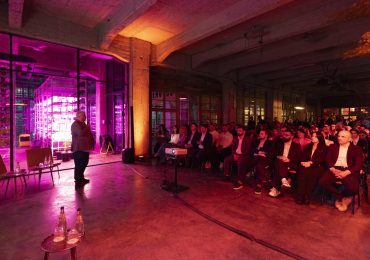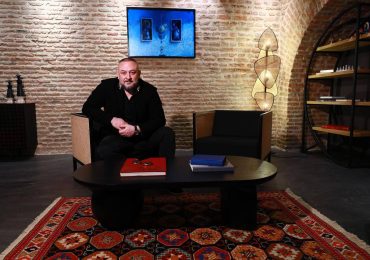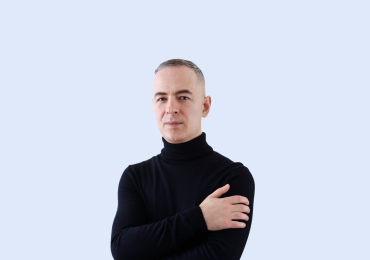Salome Mikadze, with her Georgian-Ukrainian resilient nature, turned the challenges of war and adversity into the foundation of her success, building Movadex at just 18. She believes that business’s true purpose is to provide value to others, which is why she’s creating a path for others to turn their ideas into reality. But, despite her achievements, she doesn’t stop here—and her journey continues.
You started Movadex at just 18. What inspired you to become a founder so early, and how has your vision evolved since then?
I didn’t think much about age at the time, I just followed what felt exciting and meaningful. I’ve always believed that when we’re young, we’re more willing to take risks. We haven’t yet been told all the reasons why something might not work. That openness gave me the courage to try. I found that courage at Emma Willard, an all-girls boarding school in upstate New York, where I studied on a full scholarship. It was a place that celebrated ambition and gave me space to explore.
I entered a startup competition, won, and for the first time, felt what it was like to build something of my own. That summer while I was home in Ukraine, before starting at Georgetown, I met Nor, who would become my co-founder. We came from very different backgrounds, but shared a passion for startups and building. He had the technical side, I had the business and design perspective, and Movadex was born from that mix. What began as a small studio helping startups bring their ideas to life has since grown into something much bigger. But the heart of it is still the same: curiosity, collaboration, and a deep respect for the people behind every idea.
You’ve led Movadex through turbulent times. How did you manage to keep building through all of it?
War has been part of my story long before I ever became a founder. My parents lived through the war in Abkhazia, Georgia in the early 90s, and decades later, I found myself facing the same terror, this time as an adult, a leader, and someone responsible for others. I’ve always felt a deep love and connection to both Georgia and Ukraine, two homelands that have shaped me, and that have taught me what resilience truly means.
But nothing prepares you for the moment when the world around you breaks. Suddenly, it’s not about what email to send or which investor call is next. It’s about how to keep your team safe while sitting in a bomb shelter, rockets overhead, not knowing what the next hour will bring. In those moments, I couldn’t fix everything, and frankly, I stopped trying to. I broke things down into the smallest possible steps. One decision at a time. One person at a time.
That’s how I kept going. And more than anything, I leaned on my team. The people at Movadex are true superheroes. Braver, stronger, and more focused than I could’ve ever asked for. Their courage carried us through. If I’ve learned anything, it’s that resilience isn’t about pretending everything is fine. It’s about showing up anyway – scared, tired, uncertain – and still choosing to build. Every single day.
How do your Georgian-Ukrainian roots influence your approach to entrepreneurship and leadership?
For me, it starts with resilience and depth of culture. Both Georgia and Ukraine have histories marked by hardship, but also by extraordinary strength, warmth, and a deep sense of community. These aren’t just my countries – they’re my foundation. I grew up hearing my mother’s story of fleeing during the war in Abkhazia, and how Ukrainian soldiers dropped loaves of bread from helicopters to families escaping through the mountains.
Decades later, we now see Georgian fighters standing side by side with Ukrainians in defense of shared freedom. That spirit, of solidarity, generosity, and courage, is powerful. It’s also how I lead. I bring my whole self into entrepreneurship, and I expect the same from the people I work with. I believe in trust, not control. In collaboration, not ego. And in building through the hard times, not just the easy ones. My roots taught me that no matter how different we are, there is always something greater that connects us. That belief shapes everything I do, in business and in life.
What does it mean to you to be a Knight-Hennessy Scholar at Stanford, and how has that experience shaped your current work?
Being a Knight-Hennessy Scholar is both an honor and a daily reminder of the responsibility that comes with potential. It means being surrounded by people who are relentlessly curious, boldly entrepreneurial, and deeply committed to creating impact, not just in their careers, but in their communities and countries. The program, shaped so thoughtfully by John, Tina, and the entire KHS team, cultivates leaders who lead with empathy, purpose, and vision. It’s not just about ambition, it’s about how you build, who you serve, and why it matters. For me, it’s also deeply humbling.
Every day, I walk into rooms filled with people doing extraordinary things, and I find myself listening more, learning more, and reflecting more. Yes, imposter syndrome is real, but so is the growth that comes from being in such a rare, brilliant ecosystem. KHS has shaped the way I will lead at Movadex and in my life. I choose to lean into collaboration. I make space for perspectives different from mine. And I stay open – to feedback, to reinvention, and to the unknown. Because that’s what being a Knight-Hennessy Scholar is about: exploring bravely, building thoughtfully, and believing, even when the road ahead isn’t clear.
Movadex has helped launch over 100 startups across the globe. What’s your secret to consistently delivering fast, scalable, and user-loved MVPs?
In the early stages of Movadex, I created what we now call our MVP Development Framework. It’s a system that allows founders to transform their vision into mockups and tangible product experiences in just a few days. Over time, it’s evolved into more than just a framework. It’s become a way of thinking, building, and co-creating with early-stage teams. The secret, however, goes beyond speed or technical skill. What truly sets us apart is our ability to connect with what the founder imagines, even when they can’t fully explain it themselves. Founders often carry big, bold ideas in their minds, but those ideas can feel abstract or out of reach when it comes time to build. That’s where our work begins.
The team treats the product development process as a collaborative exploration. Through thoughtful interviews, strategy sessions, and moodboarding, we try to tap into the founder’s subconscious vision, understand what really matters to them, and translate that into a clear, engaging product experience. It’s both deeply strategic and highly creative. Our design and product teams are incredibly intuitive, and they know how to ask the right questions, spot patterns, and bring clarity to complexity. That’s why our MVPs not only get built fast but also resonate deeply with users. Because they’re not just functional—they reflect the heartbeat of the founder behind them. That level of care and collaboration is what makes our work both effective and meaningful.
What are some common mistakes you see early-stage founders make when building digital products, and how do you help them avoid those?
One of the biggest mistakes I see is founders overinvesting—both in time and resources—into building a “perfect” product before they’ve ever spoken to their first users. It’s completely understandable. Founders are visionaries, and they care deeply about what they’re building. But the truth is, no matter how much research you do, your initial product hypothesis will almost always shift once it meets the real world. At Movadex, we encourage founders to launch sooner, not later. The goal isn’t to skip quality, but to learn quickly and build iteratively based on actual user feedback.
Innovation doesn’t happen in isolation—it happens through constant interaction with the people you’re trying to serve. Of course, launching early can feel risky. There are always trade-offs. But the risk of waiting too long, perfecting something that misses the mark, is even greater. Product-market fit is not something you guess into—it’s something you uncover by listening, testing, and evolving. That’s exactly what we help founders do. We bring structure, clarity, and momentum to early-stage teams so they can focus on what matters most: learning from users and building what truly works.
How do you decide which human problems are worth solving with technology, and what’s the process behind creating impactful tech products?
In 2019, I conceptualized and built an MVP development framework designed to help early-stage founders validate and visualize their startup ideas in just 10 days. It was a response to the overwhelming complexity many faced at the idea stage—and it’s become the foundation of how we approach product strategy at Movadex.
To this very day, it starts with a simple filter: is this a real problem for real people? Not just a nice-to-have, but something that actually creates friction in someone’s life or work. We’ve worked across almost every industry, from healthcare to EdTech, legal tech, art platforms, SaaS, and the pattern is always the same. The best products solve very human problems with very intentional tech. Technology is a powerful tool, but it’s only worth using when it adds clarity, speed, or access to something people already need.
Movadex process always begins by listening. What’s the root pain point? What’s broken in the experience? Once the team understands that, we work with the founder to strip the idea down to its core – no fluff, no unnecessary features. Just the one thing that matters most. We don’t jump into building right away. First, we pressure-test the idea, map out user journeys, and figure out whether tech is actually the best medium. Sometimes it’s not. But when it is, and when it’s done right, that’s when you get products that actually land, that people adopt, and that grow. The impact doesn’t come from the tech itself. It comes from solving the right problem at the right time, with the right people behind it.
How does your team approach integrating generative AI into the UX and design strategies of Startups?
Generative AI is everywhere right now, and naturally, most of our clients are curious about how to integrate it into their products. We always start by taking a step back. Before adding anything, we try to understand whether AI will actually improve the experience, or if it’s being added just because it feels expected. There’s a phrase people use, “ChatGPT wrapper”, and while some of those products solve meaningful problems, many don’t go far enough.
Our focus is on helping teams figure out where AI can genuinely support users, whether that’s through automation, personalization, or simplifying a complex task. Sometimes it’s useful, sometimes it’s not. And that’s okay. We approach it by looking at the product’s goals, the user’s pain points, and whether AI can do something better or faster than traditional logic. Then we work closely with the design team to make sure it feels natural and intuitive, not overwhelming or forced. In the end, it’s less about “using AI” and more about using the right tools to serve people better. That’s what makes the difference.
You lead a team across borders. How do you foster collaboration and culture in a fully global, remote setup?
Leading a fully global team has been one of the most rewarding challenges of my career. It’s not just about managing across time zones – it’s about learning how to build trust, spark creativity, and foster belonging across cultures. Before starting my MBA at Stanford, I helped shape the foundations of Movadex as a globally-minded, remote-first company. From day one, we knew that the future of work was borderless, and we leaned into that belief.
While I’m currently focused full-time on my studies at Stanford, I remain deeply committed to refining the frameworks that helped us grow. This chapter is about listening, learning, and preparing to plant new seeds. Primarily, we hope that we will be opening a Movadex hub in the Bay Area in late 2025 or early 2026. We see it as a natural evolution—not just for business, but for deepening our connection with one of the world’s most innovative ecosystems.
Culture, to us, has never been an afterthought. From surprise care packages to spontaneous team check-ins, we’ve made it a habit to show up for each other, even oceans apart. My co-founder Nor and I have always been just a call or message away, not because we have to be, but because that’s the kind of leadership we believe in. Our global setup doesn’t make collaboration harder, it makes us better. It teaches resilience, sharpens empathy, and inspires us to think beyond borders. And as we look ahead, we’re excited to continue building in ways that honour that spirit.
What challenges have you faced as a young female founder in a tech world — and how did you overcome them? What advice would you give to young women who want to start leading in tech?
When I started, I was 18, and honestly, I wasn’t fully aware of the gender gap at first. I was just excited to build. It wasn’t until we began hiring that I noticed it clearly. Only men were applying for engineering roles. I remember wondering, where are the women? That was a turning point. Now, I take time to mentor young women in STEM around the world, whether it’s through startup ecosystems, university programs, or tech hubs. Representation matters, and we all need to see someone just a few steps ahead of us to believe we belong.
My advice to young women is simple, but not always easy: keep going. Don’t let anyone shrink your ambition. The path isn’t always fair, and progress takes time, but every step forward counts, not just for you, but for those coming after you. Justice Ruth Bader Ginsburg, who also attended Emma Willard like I did, once said: “Fight for the things that you care about, but do it in a way that will lead others to join you.” That quote stays with me. It’s not just about breaking into tech. It’s about bringing others with you once you’re there. You belong in the room. So take the seat, and when you can, pull up another chair for someone else.
What can global founders learn from the agility and resilience of Eastern European Entrepreneurs?
There’s a certain mindset that comes from growing up or building a business in Eastern Europe, a quiet toughness, a deep adaptability, and a refusal to give up, even when everything around you says you should. After witnessing the atrocities of war firsthand, I can honestly say that no business decision, no fundraising challenge, no product pivot will ever shake me the way that did. It shifts your perspective completely. You realize what actually matters. You learn to act fast, stay grounded, and keep going, even in uncertainty, even in fear.
Eastern European founders build with a different kind of urgency. Not the pressure of competition, but the pressure of reality. There’s less room for ego, and more space for problem-solving. You become resourceful not because it’s a strategy, but because you have to be. What global founders can learn is that resilience isn’t just about pushing through, it’s about adapting with purpose. It’s about knowing when to let go, when to rebuild, and how to keep your team close even when the world feels far apart. And maybe, it’s also about remembering that business isn’t the whole world, but it can be a force for good within it.
What’s next for Salome Mikadze and Movadex? Any upcoming projects or goals you’re excited about?
This past year has been profoundly transformative. I became a mother, and our daughter just turned one—a milestone that’s reshaped not only how I think about work, but why I care about it so deeply. My focus has shifted from building something impressive to building something meaningful. I want my daughter to grow up in a world where peace, innovation, and purpose define her future. That vision is what quietly guides my next steps.
While I’m currently pursuing my MBA at Stanford, I’ve been reflecting deeply on the future of Movadex and the role I hope to play once I complete my studies. One goal I’m especially excited about is establishing a U.S. hub for Movadex in the Bay Area, likely in late 2025 or early 2026. But at the same time, what matters just as much – maybe more – is continuing to grow our presence in Lviv. That office has become a symbol to me. Today, it’s not just a space for product sprints and brainstorming sessions. It’s a place where people ask life-altering questions, about safety, displacement, survival. It’s a place where decisions are made with both business urgency and emotional weight. Where we design wireframes in the morning and navigate refugee paperwork at night.
One day, I hope that office will no longer carry the burden of war. I hope it becomes a thriving hub of innovation, creativity, and peace. A place where we no longer have to make emergency plans or count the days since the last emergency siren, but instead, build freely, honor those we lost, and shape a better future for those still to come.
Movadex will continue to support founders globally, helping them bring new ideas to life. But I also want us to be known for something more: for being a team that never stopped building, even when it felt impossible. For being human-first in everything we do. And for me personally, I’ll keep showing up – as a founder, as a mother, and as someone who truly believes that technology, when used with care, can help us imagine and create a more compassionate world. If I can help shape that world, even in a small way, that will be the legacy I leave behind for my daughter. One of resilience, hope, and the unwavering belief that we can always build better.


